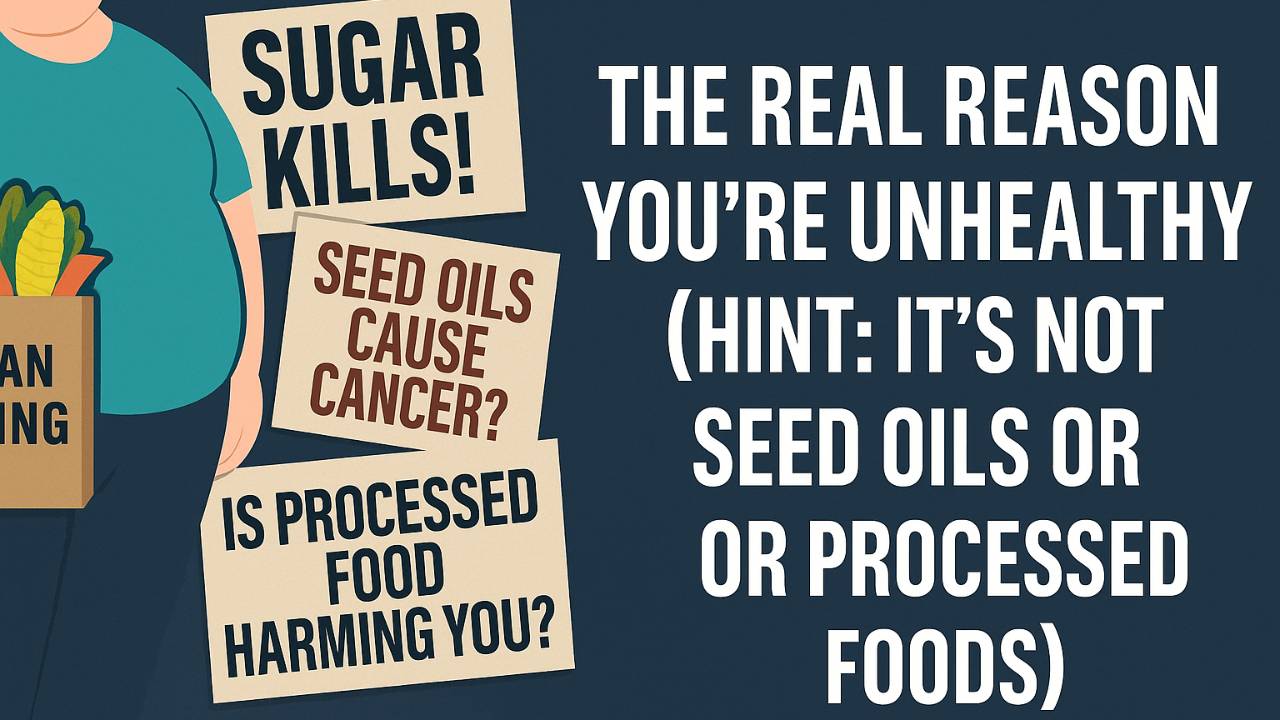The Real Reason You’re Unhealthy (Hint: It’s Not Seed Oils, Sugar, or Processed Foods)
Jun 06, 2025
It’s Not Seed Oils, Sugar, or Processed Foods: Here’s What’s Actually Killing People
Introduction: The Truth That Social Media Won't Tell You
If you spend any time on health and fitness social media, you've probably heard:
-
"Seed oils cause cancer"
-
"Sugar is toxic"
-
"Ultra-processed foods are ruining your health"
But the real danger? It's not the ingredients. It's not the oil in your salad dressing, the sugar in your fruit, or even the occasional donut.
The real, science-backed danger is excess body fat.
This article breaks down why the health risks associated with these foods are wildly overstated, and why your body composition and fat loss status matter far more than obsessing over single ingredients.
Why Most Nutrition Fear-Mongering Is Scientifically Weak
Much of the fear-based health content online is rooted in poor-quality research. These include:
-
Animal studies using 100–1000x human doses (injected into rats or applied in petri dishes)
-
Mechanistic studies that explore biological pathways but don't track real outcomes
-
Epidemiological studies that don't control for calories, protein, or body weight
These types of studies can raise questions, but they don't provide answers about real-world human health outcomes.
To understand what actually harms or helps your health, we need to rely on the highest-quality human outcome studies available:
-
Large prospective cohort studies
-
Pooled analyses with individual-level controls
-
Global systematic reviews by organizations like the WHO
Human RCTs (randomized controlled trials) are the gold standard, but they can’t ethically be done for long-term mortality or cancer. You can't assign people to become obese and track who dies first.
So, the best available science for health outcomes like mortality, heart disease, and cancer comes from well-controlled, long-term observational data — and the results are crystal clear.
Sugar: Is It Really the Problem?
The Claim:
Sugar causes cancer and increases mortality.
The Reality:
A large human study (PMID: 30590448) found that consuming >20% of calories from sugar led to a 30% increased risk of death.
BUT:
-
The increase was entirely due to sugar-sweetened beverages (SSBs)
-
When SSBs were removed, there was no link between sugar and death
-
When calories were controlled, even SSBs showed no increased risk
Bottom line: It’s not the sugar. It’s the calories.
Seed Oils: Not the Villain They're Made Out to Be
The Claim:
Seed oils cause inflammation, cancer, and metabolic disease.
The Reality:
Most of those claims come from:
-
Rat studies with non-human dosages
-
Mechanistic theories about oxidation
-
Cherry-picked data with no calorie control
Meanwhile, human outcome studies (PMID: 40048719) show:
-
No increased risk of death
-
In some cases, slight improvements in health markers
Bottom line: Seed oils aren’t a miracle food, but they’re also not toxic. When consumed in normal amounts within a calorie-controlled diet, they pose no harm.
Ultra-Processed Foods: Context Is Everything
The Claim:
UPFs are the cause of obesity and chronic disease.
The Reality:
In a well-controlled NIH study (PMID: 31105044):
-
Participants ate 500+ extra calories per day on a UPF diet
-
Meals were matched for calories, protein, carbs, and fat
-
The difference? UPFs were hyper-palatable and low in satiety
UPFs aren’t toxic — they just make it easy to overeat.
Bottom line: It’s not the food itself. It’s your total intake.
Obesity: The Risk That Dwarfs All Others
Here’s how excess body fat stacks up against any ingredient fear:
-
Overweight (BMI 25–29.9): 25–30% increased mortality
-
Obesity (BMI 30–34.9): 60–70% increased risk
-
Obesity (BMI 35–39.9): 85–100% increased risk
-
BMI ≥40: Up to 250% increased risk of death
Sources: PMID: 29490333, 36756765, 37405977
Even those who are "metabolically healthy but obese" still carry elevated risk (PMID: 36482073).
And when people say, "But I eat clean and have good labs" — here's what the data says:
-
Lancet (PMID: 27423262): 10M+ people; increased mortality independent of diet/lifestyle
-
IARC / NEJM (PMID: 27557308): Obesity linked to 13+ cancers
-
UK Biobank (PMID: 28935036): "Healthy obese" still had elevated cardiovascular risk
Bottom line: You can be healthy and overweight in the short-term. But long-term, it catches up.
So, Should You Ignore Food Quality?
Absolutely not. Whole, minimally processed foods:
-
Support better satiety and appetite regulation
-
Improve digestion, energy, and mood
-
Help make calorie control easier
But food quality doesn’t override energy balance.
You can gain fat eating clean. You can lose fat with flexibility.
Focus on sustainability, not fear.
The Real Health Hierarchy
Let’s put it plainly:
-
Fat loss done sustainably will improve nearly every health marker
-
Obsessing over ingredients while ignoring body composition is majoring in minor things
-
Flexible, educated nutrition wins long-term
You don’t need to fear food. You need a system that works for your lifestyle, psychology, and metabolism.
Free Tools to Help You Get Started
🎯 Free eBook – Art of Fitness Psychology: Master the mindset and strategy behind sustainable fat loss
🎁 Free Resource Vault – www.shaunsurgener.com/free-resources: Access guides on fat loss, muscle building, meal planning & more
📞 Book a Free Strategy Call – Schedule here: Let’s talk about your goals and map out your next steps
Final Thoughts
Don’t let cherry-picked headlines or fear-based influencers hijack your health journey.
The truth is simple: Fat loss done right is the most powerful lever you can pull for long-term health.
Focus on that — and you’ll finally start moving forward with clarity and confidence.
Join Our Mailing List
Subscribe to our newsletter to receive the latest news and updates straight to your inbox
We hate SPAM. We will never sell your information, for any reason.





